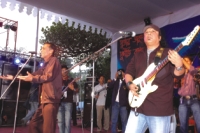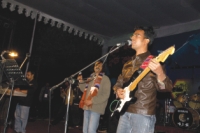|
Music
A fight against corruption
Elita Karim
 |
Suman from Aurthohin.
Photo: Imtiaz Alam Beg |
Marking the end of 2006, on December 29, Transparency International Bangladesh, supported by The Daily Star, Channel i, Bangla Vision, Radio Today and Radio Furti, organised an open air concert at the Gulshan Youth Club field. Voicing out against corruption, major musical bands and performers got on stage to the delight of an audience of at least 20,000.
Major names like Azam Khan, LRB, Miles, Renaissance, Souls, Feedback, Warfaze, Dolchut, Black featuring Sumon from Aurthohin, Artcell, Hyder Husyn, Mehreen, Fahmida Nabi, Rob Fakir, Shahjahan Munshi and many more took to the stage to raise their voices against corruption in Bangladesh, with the slogan Durjoy Tarunno Durnoti Rukhbei (The youth will fight corruption). Professor Yunus expressed his solidarity through a video message. Professor Mozzafar Ahmed, Advocate Sultana Kamal, Abdullah Abu Sayeed, Professor Zafar Iqbal and Mozammel Hossain Monju along with the Bangladesh Cricket Team took an oath against corruption ending the concert with a solidarity song.
 |
Musicians and organisers take to the stage at the end of the show.
Photo: S Kabir |
Anchored by Sharmin Lucky and Additya Kabir, the concert was arranged and promoted by Twintees Entertainment Ltd, EFA and Cool Exposure with SAS providing the sound system. The concert began with words against corruption by the TIB Chairperson, Dr Mozzafar Ahmed. According to him, corruption would further increase the poor segment in the country and thus
needs to be fought against.
Asif Mukeet recently shifted to Dhaka in 2004 from his village in Chandpur. Having completed his MBBS from Chittagong Medical, he now looks after his uncle's private chamber in Kakrail. Proud to be one of the very 'well-educated' ones in his village (the only doctor in the village so far, besides an engineer and a wholesaler with an MCom degree), his family got him married before settling down in Dhaka. Overwhelmed with the new sights and concepts around, they finally rented a modest flat near his workplace. It was then that he got a whiff of the 'underhand' businesses that go on in the city to get something done. “I applied for a telephone line as soon as I had settled down which I received almost a year later,” says Mukeet. “In fact, I had to spend an extra amount of Tk 25,000, just to get the line through and working
 |
Professor Abu Syeed, talking to the young crowd at the TIB concert |
properly.” There was a time when Mukeet had become a regular visitor to the T&T office, where he would wait for hours at a stretch but in vain.
At a government run hospital in Dhaka, Shah Alam, a mechanic, had to pay at least Tk 1,200 to the blood bank officer, just so he could get two bags of blood for his aunt who had come to the hospital from her village for treatment. “According to the officer,” says Alam. “I need to give him a bag of blood belonging to a different blood group in exchange for the group that I need for my aunt. Since I could not prepare the bag of blood on time, I had to buy the bag. But this is insane and is not expected from government run hospitals.” the bag. But this is insane and is not expected from government run hospitals.”
 |
LRB featuring Azam Khan.
Photo: S Kabir |
Yet another common scene in the country is the frequent exchanges of ghush (bribes) that take place between the traffic sergeants and drivers of the many kinds of vehicles in the country. Due to this, not only do the traffic officers have the advantage to earn a little something extra, but owners of many buses and public transport escape the law and are allowed to move illegally on the streets. Many such vehicles either do not have a proper fitness certification, choking out black smoke or are simply too dangerous to be let loose on the streets. This has been one of the major reasons behind the many accidents that occur on roads, the waterways and also air-ways where the government-run air buses are shabbily maintained.
 These are just some of the many corruption cases that take place in the country at a small scale which people are used to by now. “In fact, I can't think of getting anything done without the extra bit of money that would be needed to get the work done properly and on time,” says Rizwan Islam, a final year student of a private university who recently began an events management firm. “And frankly, I don't feel any shame in paying the extra bribe anymore. It is no use just waiting for the work to get done, since it never will unless I confirm the extra thousand or two.” These are just some of the many corruption cases that take place in the country at a small scale which people are used to by now. “In fact, I can't think of getting anything done without the extra bit of money that would be needed to get the work done properly and on time,” says Rizwan Islam, a final year student of a private university who recently began an events management firm. “And frankly, I don't feel any shame in paying the extra bribe anymore. It is no use just waiting for the work to get done, since it never will unless I confirm the extra thousand or two.”
 |
Photo: S Kabir |
According to a Transparency International report, corruption cannot be defined as a single or a separate entity. It is not possible to isolate it and destroy it then and there. It is rather a complex set of processes involving human behaviour and many other variables, some of which are difficult to recognise or measure. The whole idea of corruption is usually related to just the economic exchange, generated by a monetary or 'economic' motive or some kind of a political activity, motivated by a desire to attain or retain political power. The process of corruption is more than economic or political - it is a social process as well, existing side-by-side with, and sometimes complementing economic and political activity. (Corruption in Bangladesh: An Analytical and Sociological Study by Almas Zakiuddin.)
 |
Photo: Imtiaz Alam Beg |
At the concert, Professor Abu Sayeed chairperson of Bishwa Shahitya Kendra, said that corruption will always be there in Bangladesh. “Unless the young people do anything about it, corruption will be passed on to the generation next and then the next,” he said. “It has become such an integral part of getting the work done, that everyone has accepted it with open arms, choosing to ignore it, which should not be the case.” He further added, making the audience laugh, that the only way to catch a corrupt officer red handed is for a group of at least 50 young boys and girls to move from one office to another, playing the dhol to announce their arrival, and pay a tribute with a garland of flowers to the most corrupt officer in that particular office. “And don't forget to wish him luck for next year,” he quipped.
 |
Photo: Imtiaz Alam Beg |
Many say that poverty might be the source of all corruption issues in the country. “There was seven times more poverty in my day, as compared to now,” said Professor Abu Sayeed. “However, I don't remember having any corrupt officials or a thieves in my neighbourhood, which is a common scenario today.”
Though a very small step, the TIB concert which marked yet another end of an eventful year in Bangladesh, was a conscious effort taken by artists to speak against the evils of corruption. Many criticise the outcome of such a concert which was held, where, at least 25,000 tickets were simply distributed at many locations and organisations in Dhaka rather than being sold. “Most people were there just to watch their favourite musicians and listen to them sing,” says Rayhan Khan, an HSC candidate. However, there are some who believe that this was just the beginning of the awareness being built amongst the young people. For a country, which recently won the Nobel Peace Prize for working against poverty, the year 2007 might just be the moment for everyone to create a revolution in their very own way to say no to corruption and take small steps to building a stronger and a peaceful nation.
Copyright
(R) thedailystar.net 2007 |
